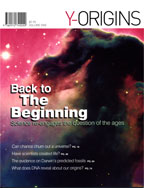Questions and Answers
Q. What new discovery in astronomy has provoked many leading scientists to rethink the origin of our universe?
A. Most scientists thought the universe had always existed until Edwin Hubble observed that the universe is expanding. Scientists now believe that the universe originated with a one-time explosion of incredible force called, “the big bang.” But scientists wonder how everything in our cosmos could come from nothing. Something or someone must have been there to cause it to begin. Astrophysicist George Smoot (an agnostic) said, “If you’re religious, it’s like looking at God.”(See "Did the Universe Have a Beginning?")
Q. How could a "big bang" randomly result in the conditions necessary for life?
A. Scientists have calculated that several conditions vital for life needed to be fine-tuned to a razor’s edge. Without this precise fine-tuning, our universe wouldn’t exist, let alone support life.
Leading astrophysicist Stephen Hawking writes, “The odds against a universe like ours emerging out of something like a big bang are enormous....I think there are religious implications whenever you start to discuss the origins of the universe.” (See "Why is Only Earth Suitable for Life?")
Q. How do scientists account for such incredible odds against life existing on Earth?
A. Many scientists admit that a finely-tuned universe, and a “just right” solar system and planet couldn’t have happened without a superintelligence. Others chalk it up to an incredible coincidence.
A few prefer to believe a speculative theory, that there may an astronomical number of universes, and that ours just happens to be the one that supports life. However, theoretical physicist, Paul Davies confides what many scientists conclude, “It seems as though somebody has fine-tuned nature’s numbers to make the Universe....The impression of design is overwhelming.” (See "Is the Universe a Product of Design or Chance?")
Q. Could intricate organs like the eye have evolved by unguided natural processes?
A. Darwinian natural selection doesn’t explain how the eye’s many individual components could independently evolve, yet synchronize together to produce sight. Several molecular biologists conclude that irreducibly complex systems, like the eye, have been designed. Even Darwin admitted that the eye still gave him a “cold shudder". (See "Was Darwin Right About the Eye?")
Q. Can DNA's detailed coding be explained by natural processes?
A. DNA’s intricate complexity caused its co-discoverer, Francis Crick, to call it “almost a miracle.” Since no scientific process, including natural selection, is able to explain DNA’s origin, many scientists believe that it must have been designed. Antony Flew was so impressed by the genius behind DNA that he renounced 50 years of atheistic leadership, arguing that DNA must have been designed by a superior intelligence. (See "Does DNA Point to a Designer?")
Q. Does evidence support Darwin's theory that all life evolved by undirected natural processes?
A. Evidence supports Darwin’s theory of microevolution, where environmental adaptations result in variations within a single population, such as a species. This is why viruses mutate, house insects have evolved resistance to our pesticides, and dogs, cats, and humans, come in various shapes sizes and colors. Scientists are correct when they state Darwinian microevolution is factual.
However, Darwin’s theory of macroevolution, says that over time, undirected natural processes led to all life forms, from the most primitive cell to human beings. He predicted countless fossils would prove him right. But the transitional fossils Darwin predicted would validate macroevolution are embarrassingly absent. Even ardent evolutionist, Niles Eldredge admits, “No one has found any such in-between creatures...and there is a growing conviction among many scientists that these transitional forms never existed.” (See "Where are Darwin's Predicted Fossils?")
Q. What do DNA and the fossil trail reveal about human origins?
A. Mitochondrial DNA studies have shown that our species originated from one location, and one mother (they call Eve). Although fossil hunters have discovered a few extinct species of hominids, these creatures are vastly inferior to humans in their intellectual capacities. Thus paleoanthropologists remain baffled by the single origin and sudden appearance of Homo sapiens in the fossil trail. (See "Are Humans the Result of Evolution?")
Q. If a designer exists, has he given us clues that reveal what he is like?
A. Many scientists believe that a designer has put his “fingerprints” on the cosmos. Theoretical physicist Paul Davies writes, “If physics is the product of design, the universe must have a purpose, and the evidence of modern physics suggests strongly to me, that the purpose included us.” The evidence seems to indicate that the designer is not just purposeful, but that he is also personal, superintelligent, and immensely powerful.(See "Is a Designer Revealed in Creation?")
Q. Why do scientists disagree about the evidence for design?
A. Some scientists, regardless of the evidence, cannot accept intelligent design because they are adamantly opposed to the possibility that God is involved in the development of life. Others deny the existence of any higher power. Like Stephen Jay Gould, they believe that we are merely “cosmic accidents.”
On the other hand, an increasing number of scientists have recognized evidence for intelligent design behind all the laws of science and the fine-tuning in the universe. Intelligent design proponents advocate “following the evidence, wherever it leads.”
Q. Are intelligent design and biblical creationism the same?
A. Although some mistakenly lump them together, their premise is so different it’s like comparing apples and oranges. Biblical creationism looks at science through the lens of Genesis, whereas intelligent design draws its inferences about our origins from scientific discoveries without any such filter. Intelligent design advocates vary in their religious beliefs, and leave the identity of the designer to theologians. Biblical creationists, on the other hand, specify the designer as the Judeo-Christian God. An increasing number of scientists believe that the discoveries in science point more and more to a position totally consistent with the Bible.
|




